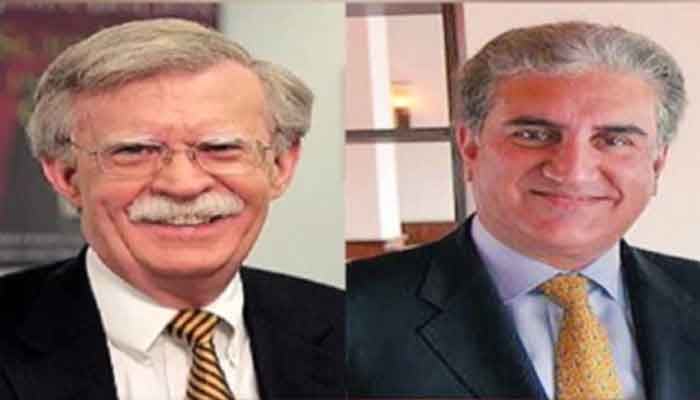US NSA lauds Pak steps to de-escalate tensions
The United States has appreciated Pakistan’s measures which helped lowering the tension and urged continued restraint on both sides. Foreign Minister Qureshi informed Ambassador Bolton about the de-escalatory measures taken by Pakistan.
ISLAMABAD: Pakistan and the United States while assessing the security situation in the region emphasised that there was a need for dialogue between Pakistan and India to find peaceful resolution to all outstanding disputes.
The United States also appreciated Pakistan’s important role in the Afghan peace process and both countries have agreed to work together to pursue the process. In a telephone conversation, US National Security Adviser Ambassador John Bolton and Foreign Minister Shah Mehmood Qureshi took the opportunity to discuss regional security situation following the Pulwama incident.
The United States has appreciated Pakistan’s measures which helped lowering the tension and urged continued restraint on both sides. Foreign Minister Qureshi informed Ambassador Bolton about the de-escalatory measures taken by Pakistan.
He said that Prime Minister Imran Khan decided to hand over the Indian pilot as a gesture of goodwill towards India. “The purpose of the call was to provide him Pakistan’s perspective on the recent regional developments, and the foreign minister cautioned against any Indian misadventure, keeping in view the forthcoming elections,” said the Foreign Office.
It is no secret that US President Donald Trump seeing Pakistan’s reaction to India’s earlier intrusion deep inside its territory pressed panic button and senior US officials started dialling phones to New Delhi and Islamabad.
“Ambassador John Bolton informed the foreign minister that he and Secretary of State Pompeo, despite being actively engaged in talks with DPRK in Hanoi, monitored the developments between Pakistan and India and kept contact with the leadership of two countries to ensure that the security situation in the South Asia region did not deteriorate,” said the Foreign Office.
Shah Mehmood clearly informed Bolton that Indian aggression of 26 February was a violation of Pakistan’s territorial integrity and sovereignty as well as the UN Charter. He also said that Pakistan’s response on 27 February was purely in self-defence against external aggression. Qureshi reiterated Pakistan’s stand saying it wished peace and stability in the region.
This has led to Pakistan’s high commissioner to New Delhi returning to Delhi after consultations. “Pakistan would send an official delegation to India on 14 March to discuss the agreement on the operationalisation of the Kartarpur Corridor. Pakistan was also ready to continue weekly contacts at the Military Operations Directorate level,” Ambassador Bolton was informed.
Meanwhile, in an unrelated development, Deputy Chairman of Cabinet of Ministers and Minister of Foreign Affairs of Turkmenistan, Rashid Meredov will visit Islamabad today (Tuesday). The Turkmen foreign minister is being accompanied by a high-level delegation comprising of Turkmen minister for energy and other high-level officials.
“The two foreign ministers will lead their respective delegations to the second round of Pakistan-Turkmenistan Bilateral Political Consultations (BPC), to be held in Islamabad. The Turkmen foreign minister will also hold meetings with Ministers of Finance, Petroleum and Energy during his visit,” announced the Foreign Office.
Pakistan says that the Turkmen foreign minister’s visit will add momentum to existing cooperation at all fronts including bilateral, regional and multilateral. It will also reinforce Pakistan’s endeavours to deepen its engagements with Turkmenistan and build a strong economic partnership between the two countries.
Meanwhile, there was good news for Pakistan when in response to the severe drought which is affecting large parts of southern Pakistan, the European Union is allocating EUR 100,000 in humanitarian funding to bring life-saving assistance to the most affected communities. In a statement, the EU says that the aid will directly benefit 15,000 people in two of the hardest hit pockets in the region, namely Tharparkar and Naushki.
-
 ‘Chinamaxxing’ Explained: Inside Viral Gen Z Trend Taking Over TikTok And Instagram
‘Chinamaxxing’ Explained: Inside Viral Gen Z Trend Taking Over TikTok And Instagram -
 Fears Erupt About Sarah Ferguson Pulling A ‘Harry’ While Sitting On A King’s Ransom: ‘Her Leverage Still Stands’
Fears Erupt About Sarah Ferguson Pulling A ‘Harry’ While Sitting On A King’s Ransom: ‘Her Leverage Still Stands’ -
 Lisa Rinna Slams Andy Cohen For His Below The Belt Move: 'So Shady'
Lisa Rinna Slams Andy Cohen For His Below The Belt Move: 'So Shady' -
 Stunning New Photos Of The Milky Way Shed Light On How Stars Are Formed
Stunning New Photos Of The Milky Way Shed Light On How Stars Are Formed -
 Prince Harry, Meghan Face Fresh Calls To Lose Royal Titles Over ‘pseudo-royal’ Visit
Prince Harry, Meghan Face Fresh Calls To Lose Royal Titles Over ‘pseudo-royal’ Visit -
 Gordon Ramsay On His Basal Cell Carcinoma Diagnosis
Gordon Ramsay On His Basal Cell Carcinoma Diagnosis -
 Fukushima Decommissioning: Japan Deploys Snake-like Robot To Remove Nuclear Debris
Fukushima Decommissioning: Japan Deploys Snake-like Robot To Remove Nuclear Debris -
 Brenda Song Turns Macaulay Culkin's 'Home Alone' Into 'terrible' Lesson: 'Children Have To Be A Little Scared'
Brenda Song Turns Macaulay Culkin's 'Home Alone' Into 'terrible' Lesson: 'Children Have To Be A Little Scared' -
 MrBeast Vows To Book Only Starlink-equipped Flights As Global Airline Adoption Surges
MrBeast Vows To Book Only Starlink-equipped Flights As Global Airline Adoption Surges -
 Kim Jong Un Says North Korea Ready To ‘get Along’ With US But Sets Key Condition
Kim Jong Un Says North Korea Ready To ‘get Along’ With US But Sets Key Condition -
 Andrew Fears What Comes Next As Jeffrey Epstein Scandal Deepens
Andrew Fears What Comes Next As Jeffrey Epstein Scandal Deepens -
 Inside Meghan Markle's 'scary' Postpartum Preeclampsia Journey
Inside Meghan Markle's 'scary' Postpartum Preeclampsia Journey -
 'Sinners' Creator Ryan Coogler's Bombshell Statement Comes To Light After Oscar Nomination
'Sinners' Creator Ryan Coogler's Bombshell Statement Comes To Light After Oscar Nomination -
 Teddi Mellencamp Pens Sweet Message As Daughter Dove Turns 6: 'Love You So Much'
Teddi Mellencamp Pens Sweet Message As Daughter Dove Turns 6: 'Love You So Much' -
 James Hetfield's Health Struggle Amid His 2026 Las Vegas Sphere Residency
James Hetfield's Health Struggle Amid His 2026 Las Vegas Sphere Residency -
 Princess Beatrice, Eugenie Are Now Facing The Same Wait As Their Parents: ‘Their Future Has To Be Decided’
Princess Beatrice, Eugenie Are Now Facing The Same Wait As Their Parents: ‘Their Future Has To Be Decided’




